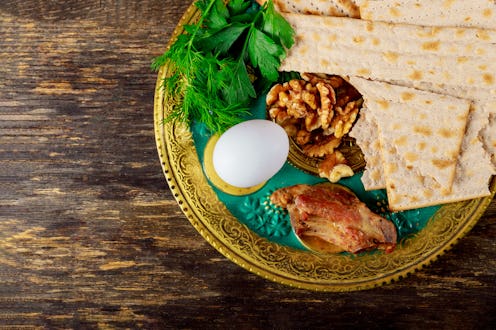
For many, 2021 is another year, and another Passover spent far away — at least physically — from the people we love most. Absent everyone in your circle being fully vaccinated, gathering around a physical Passover table may be impossible yet again. But you can still celebrate with Zoom Passover seder ideas, refined from last year’s experiences (and everyone’s improved digital skills).
Hosting a virtual seder may not be many people’s first choice, but you probably got some practice in 2020. And now that your grandma has figured out how to actually use Zoom (somewhat), you might actually be excited about some of the advantages of virtual Passover. “I got to celebrate with my chosen family all across the country, which I didn’t get to do when everything was IRL,” says Juno, 34. “I honestly think I’m going to try to keep some elements virtual even post-pandemic, so I can really welcome in everyone I love.”
However you decide to celebrate, make sure you get some key logistics out of the way nice and early — send along your Zoom room info and your Haggadah pdf in advance to avoid the rash of texts asking when and where and how. After that’s done, all that’ll be left on your plate is some matzah and a beautiful time with family and friends — perhaps in tandem with these five Zoom Passover seder ideas.
Write Your Own Haggadah
You’re going to have to send a PDF of your Haggadah for your virtual seder anyway — why not take the opportunity to write your own? Using sites like Haggadot.com, you can write your own Haggadah from scratch, with as much or as little guidance as you need (who knows what section comes when, anyway?).
Pressed for time? The cool thing about Haggadot.com is that you can assemble a DIY Haggadah from different sources. Want certain sections to focus on identity and social justice, and others to focus on wellness or history? Select those topics in the filter, browse to find your faves, select, and go.
Acknowledge Alternative Seder Plates Ahead Of Time
Especially for your non-Jewish found family that you’re breaking matzah with, make sure you send out a shopping list with plenty of seder plate alternatives for things they might not be able to quickly order. Can’t get their hands on some parsnips? Roast a carrot or two. Vegetarian? Have them broil a beet as a vegan shank bone alternative.
Bring Your Own Orange
Looking to honor your Jewish queerness during your seder, but don’t want to dive into putting together your own Haggadah? You can simply opt to encourage your fam to put an orange on their seder plate, which came about in the early 80s from Jewish lesbians at Oberlin College as a way to say, “yes, LGBTQ+ Jews belong here.”
Hiding The Afikomen Over Zoom — Clue Version
Hiding and finding the Afikomen (that half-piece of matzah that children are often tasked with finding toward the end of the seder) might seem impossible when no one’s in the same room. But that doesn’t mean you can’t get all metaphorical with it.
Julia Logan, the field manager for Jewish org OneTable, previously told Bustle that you can hide the Afikomen over Zoom by assigning the role of Afikomen to a person rather than a food. “Finding” the Afikomen will be a matter of everyone trying to guess who that person is, rather like playing Clue. Because who said the kids are the only ones who can have playtime during the seder?
Gratitude Share
There’s nothing worse as a host than convincing yourself that everyone is bored and is staying there to be polite — so, save yourself the inner turmoil by planning a brief closing activity that will take the place of “well, the drive back home is so long.” Maybe you can all go around saying what you’re grateful for, or have each guest fess up to their favorite Prince of Egypt song.
However you choose to end your seder, take pride in knowing that you created something beautiful with the less-than-ideal circumstances the world’s been dealt — which is what Passover’s really about, anyway.